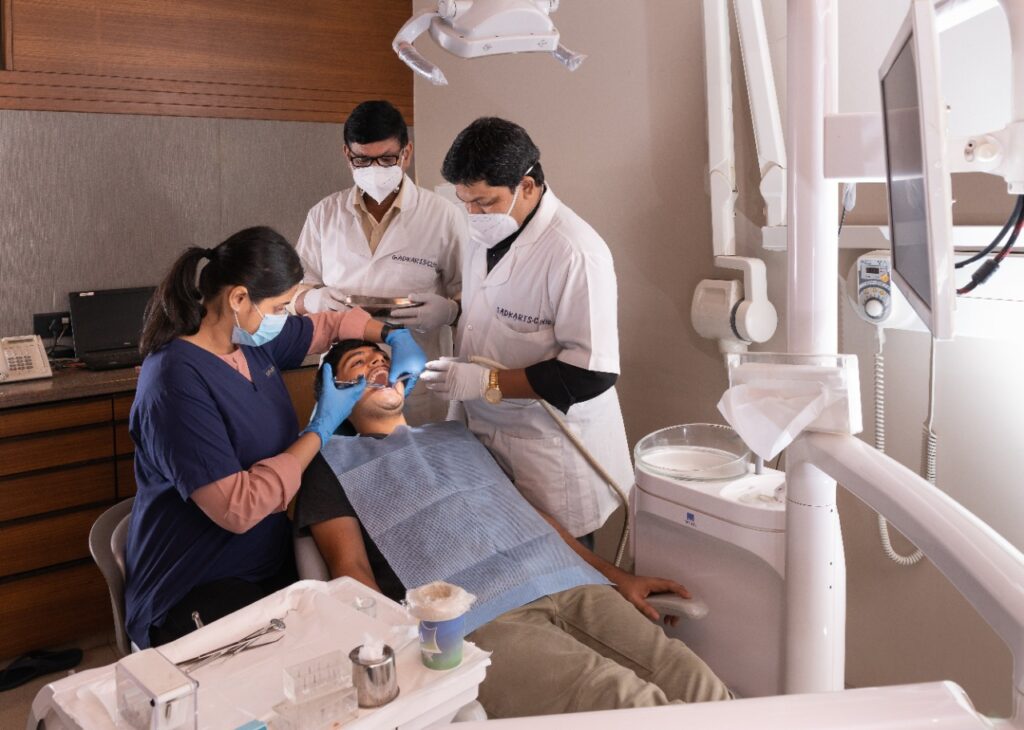Surgical Dentistry

Surgical dentistry is a branch of dentistry that practices treatment methods like teeth preservation operations, bone grafting, preparation and implantation of teeth, as well as a variety of aesthetic surgeries in periodontology.
Surgical dentistry in its practice includes tooth extraction. In cases where treatment is ineffective and tooth extraction is inevitable, the dental surgeon will professionally, quickly and without pain remove the necessary tooth.
It’s quite obvious from the name itself that what a dental surgeon does when in relation to dentistry, however, if you’re like most people, you probably don’t know what procedures specifically are involved.
No worries, many times, when a dentist mentions dental surgery it is met with widespread panic and fear from their patients. The idea is that dental surgery is a painful and expensive procedure.
However, what many patients don’t realize is that dental surgery is very common and includes procedures that address conditions that many people have and suffer from. Each patient is different and every case is treated accordingly.
For the most part, dental surgery is considered an outpatient procedure and patients can generally resume normal activity within a few days.
It is also possible to remove wisdom teeth that have grown incorrectly and interfere. When a professional surgeon-dentist is involved in tooth extraction, the occurrence of various complications is minimized.
Surgeons also remove cysts located at the top of the tooth root. In addition, each specialist in surgical dentistry, before removing the tooth, will advise the patient about prosthetics or even implantation in place of the missing tooth.
Why tooth extraction?
Advances in dental medicines have more or less minimized the necessity of tooth extraction that was once considered inevitable. But still few unfortunate situations or conditions as mentioned below make it unavoidable for our general dentists or oral surgeons to consider dental extractions.
- Tooth decay that could not be repaired by root canal treatment
- Removal of premolars for Orthodontic treatment (braces)
- Removal of retained milk tooth
- Fractured or broken tooth
- Impacted wisdom tooth
- Badly positioned tooth
- Severe damage due to infection in bone
Wisdom Tooth Extraction –
Wisdom tooth extraction is the removal of four adult teeth located in the back bottom and top corners of your mouth. These are the last (third) molars to come in, usually between the ages of 17 and 25.
When wisdom teeth don’t have space to erupt, they can become impacted and cause pain, oral infections, or other dental problems. Oftentimes, we suggest wisdom tooth removal even if impacted teeth are not an issue, as a preventative measure.
Wisdom tooth extraction is a simple procedure that takes a few days to fully recover. The procedure is done by removing the wisdom teeth through surgical incisions and surgically closing the extraction site to aid in the healing.
Cosmetic Surgery –
Cosmetic dental surgery comes in many different forms. Many times, cosmetic surgery is not a medically necessary procedure but is used to improve the patient’s face or smile. Cosmetic procedures cover minor treatments like teeth whitening and simple facial surgeries.
Smile makeovers combine two or more procedures such as teeth whitening, dental veneers, bonding, or composite restoration. Treatments to make teeth brighter isn’t just teeth bleaching. Methods like bonding and veneers are also used to fix discoloration or stained teeth.
Some patients even like having tooth shaping to fix the physical shape of their teeth. This is done by removing tooth enamel or filing the teeth. Cosmetic procedures are generally pain-free and can be completed in the clinic.
Every treatment is individualized for the patient. Regardless of whether you are looking for minor cosmetic dental surgery or a major dental procedure, we will be at the forefront of your medical journey. Many other health issues can be diagnosed and solved by keeping your oral health a top priority.
If you experience any oral pain, tooth sensitivity, pain in the neck or jaw, or notice any discoloration or bleeding while brushing your teeth, contact us today. A proactive approach to your oral health may prevent you from having any tooth loss or serious dental surgery.
